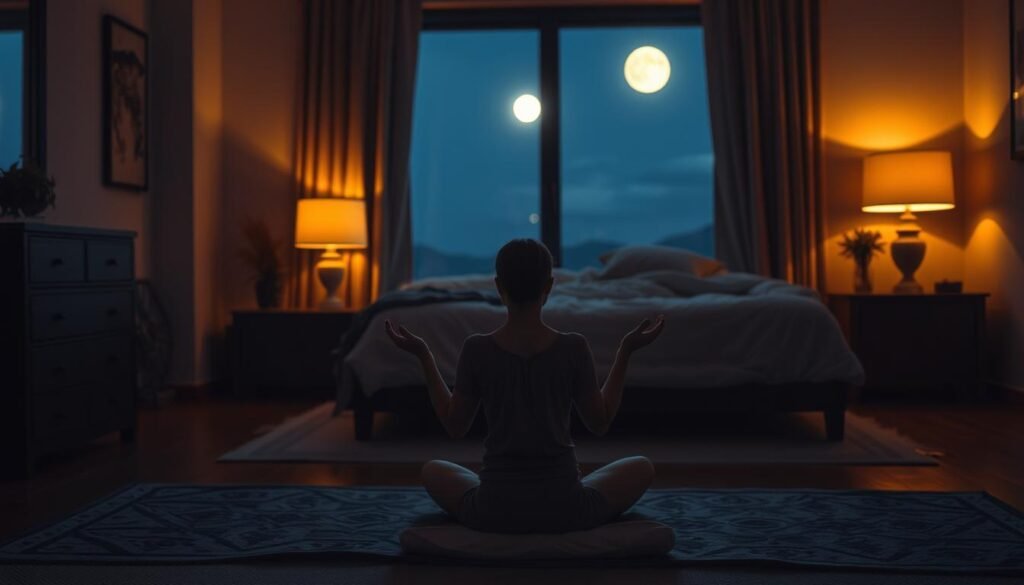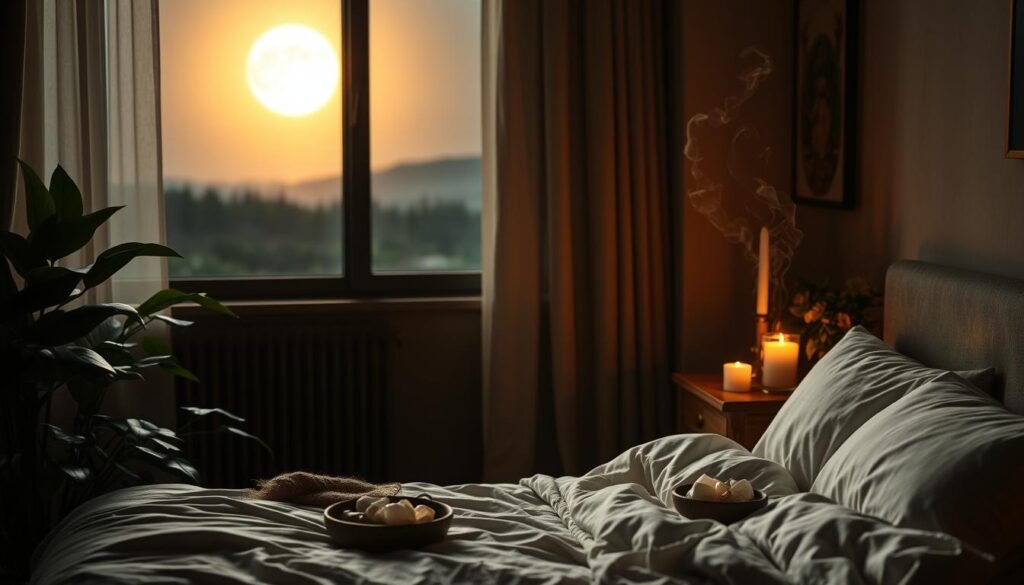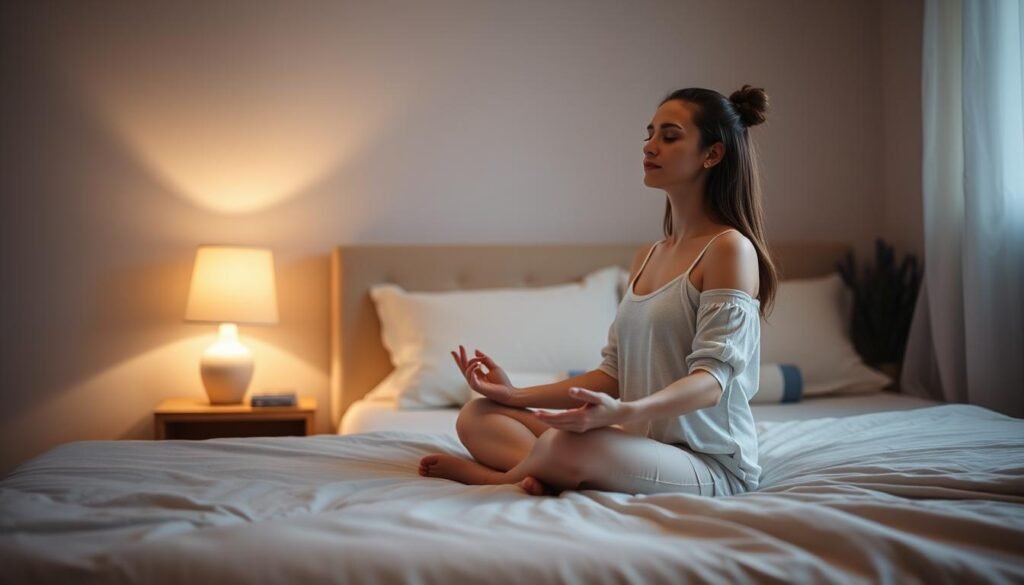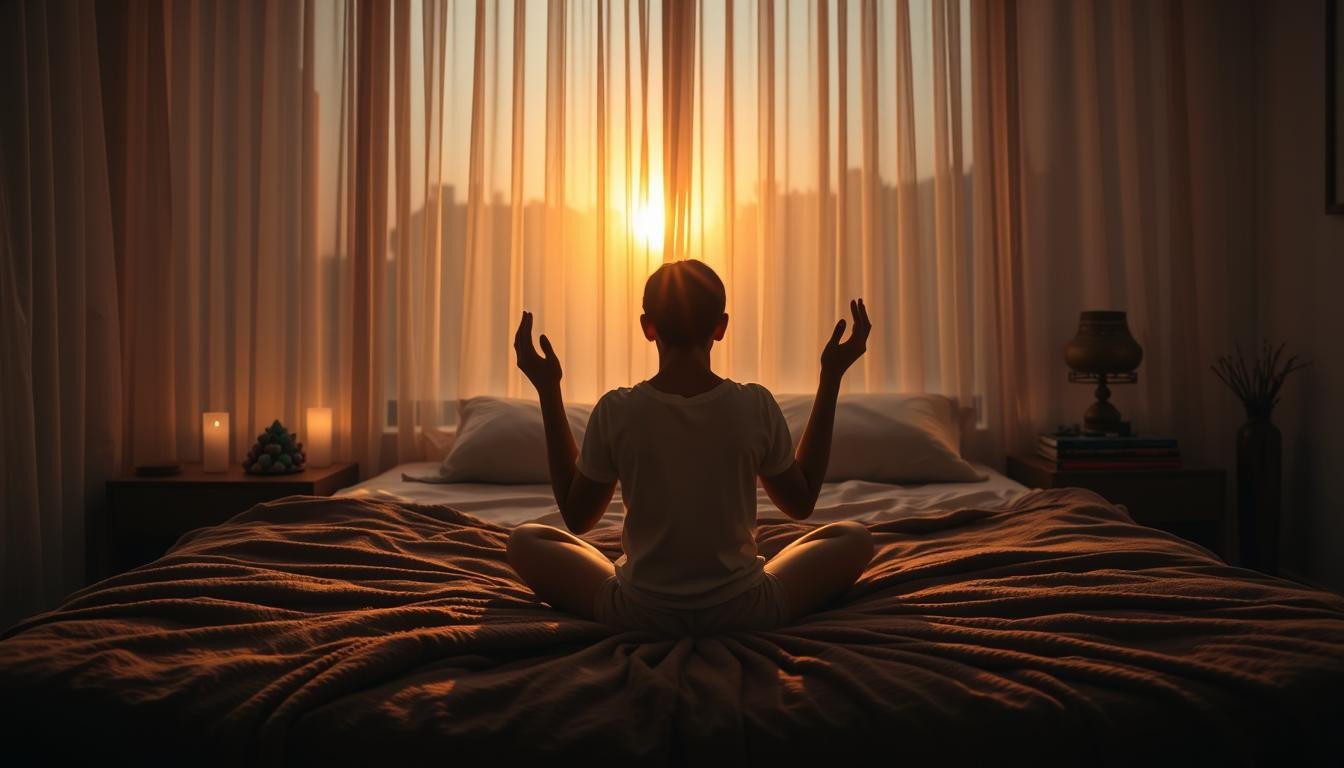I still remember the countless nights I lay awake, struggling with insomnia that left me feeling drained and frustrated. The impact on my overall health was significant, affecting not just my sleep but my daily life as well.
That’s when I discovered Reiki, a form of energy healing that can be used to improve sleep quality. By incorporating a simple pre-bed Reiki routine into my nightly regimen, I was able to transform my nights and end my battle with sleeplessness.
Many adults struggle with trouble sleeping, and conventional treatments don’t always work. That’s where energy healing practices like Reiki come in, offering an alternative approach to achieving restful sleep. By dedicating just a few minutes each day, you can experience the positive effects on your overall wellbeing.
Key Takeaways
- Reiki is a simple, non-invasive technique that can improve sleep quality.
- A pre-bed Reiki routine can help reduce stress and anxiety.
- This energy healing practice can be done at home without special equipment.
- Regular Reiki practice can lead to better overall health and wellbeing.
- Reiki is a complementary approach that can be used alongside conventional treatments.
My Battle with Sleepless Nights
For years, I struggled withinsomnia, lying awake at night, and dreading the next day’s exhaustion. My nights were filled with racing thoughts, making it impossible to relax and fall asleep. As a result, my days were marked by fatigue, lack of motivation, and a general feeling of being unwell.
The Impact on My Daily Life
The effects ofinsomniaon my daily life were profound. Simple tasks became daunting challenges, and my overallhealthbegan to suffer. I felt like I was walking around in a fog, unable to concentrate or make decisions. Myconditionwas taking a toll on my relationships and work performance.
The Turning Point
It was during a particularly tough period, when I was relying onprescriptionsleep medications, that I realized I needed to find an alternative solution. I was concerned about becoming dependent on thesemedicationsand their potential long-term side effects. That’s when I started exploring natural approaches to improving mysleep. I discoveredReiki, a form of energy healing that promised to address the root causes of myinsomnia. Initially skeptical, I was willing to try anything to reclaim my nights and restore my overall well-being.

Understanding Insomnia and Its Impact on Health
Insomnia is a complex sleep disorder that can have a profound impact on both physical and mental health. It’s not just about having a bad night’s sleep; it’s a persistent condition that can significantly affect daily life.
What Defines Insomnia?
Insomnia is characterized by difficulty initiating or maintaining sleep, or both, despite adequate opportunities to sleep, leading to impaired daytime functioning. It’s considered chronic if it occurs at least three times a week for at least three months. Chronic insomnia can severely impact an individual’s quality of life.
Common Causes of Sleep Difficulties
Various factors contribute to insomnia, including stress, anxiety, and irregular sleep schedules. Lifestyle factors such as consuming caffeine or electronics use before bedtime can also disrupt sleep patterns. Underlying medical conditions or medications can further exacerbate sleep difficulties.
- Stress and anxiety
- Irregular sleep schedules
- Caffeine and electronics use before bedtime
- Underlying medical conditions
The Long-Term Health Consequences of Poor Sleep
Untreated insomnia can lead to serious health issues, including cardiovascular disease, diabetes, and depression. The risk of substance abuse and chronic pain also increases with prolonged sleep deprivation. 
As research indicates, the effects of insomnia extend beyond individual health, impacting relationships, work performance, and overall quality of life. Cognitive Behavioral Therapy (CBT) is often recommended to address the root causes of insomnia and break the vicious cycle of sleep deprivation.
What is Reiki and How Can It Help with Sleep?

As someone who has struggled with insomnia, I discovered Reiki, a form of energy healing that has been instrumental in improving my sleep quality. Reiki is based on the idea that the body has an energy field that can be balanced and harmonized through the transfer of energy from the practitioner’s hands.
The Principles of Energy Healing
Reiki operates on the principle that the body has an intricate energy system. By applying Reiki, practitioners aim to balance this energy to promote relaxation, reduce stress, and improve overall well-being. This balance is crucial for addressing the root causes of insomnia, such as stress and anxiety.
How Reiki Addresses the Root Causes of Insomnia
Reiki can help alleviate insomnia by addressing its underlying causes. It promotes relaxation, activates the parasympathetic nervous system, and helps balance the body’s energy. Regular Reiki practice can also help reset disrupted sleep-wake cycles and reduce the physical symptoms of stress that interfere with sleep. Additionally, Reiki can calm the mind and reduce anxiety, making it easier to fall asleep.
Some key ways Reiki can help with sleep include:
– Reducing stress and anxiety that contribute to insomnia
– Promoting relaxation and activating the parasympathetic nervous system
– Balancing the body’s energy to address underlying factors contributing to sleep difficulties
– Resetting disrupted sleep-wake cycles through regular practice
– Complementing other insomnia treatments by addressing emotional and energetic causes
Preparing Your Mind and Space for the Reiki Sleep Routine
Preparing for a Reiki sleep routine involves more than just the practice itself; it requires a conducive environment and mental readiness. To combat insomnia, it’s essential to address both physical and mental factors that influence sleep quality.
Creating a Sleep-Conducive Environment
Your sleep habits play a significant role in how well you sleep. To create a restful atmosphere, avoid habits that can lead to insomnia, such as going to bed at different times or engaging in stimulating activities before bedtime. Instead, establish a consistent sleep schedule and a calming pre-sleep routine to signal your body that it’s time to rest.

Mental Preparation Techniques
Mental preparation is crucial for a successful Reiki practice. Techniques such as mindfulness and visualization can help quiet racing thoughts and reduce stress. By focusing your mind and setting clear intentions, you can enhance the effectiveness of Reiki and improve your overall sleep quality. Regular practice and patience are key to developing a restful bedtime routine.
My 15-Minute Pre-Bed Reiki Routine for Insomnia
As I reflect on my journey to overcome insomnia, I realize that incorporating a simple pre-bed Reiki routine was a game-changer for my sleep. This 15-minute practice has become an essential part of my bedtime ritual, helping me to unwind and prepare my body for a restful night’s sleep.
Step 1: Centering and Intention Setting
The first step in my pre-bed Reiki routine is centering and intention setting. I begin by finding a quiet and comfortable space where I can sit or lie down without distractions. I take a few deep breaths, inhaling calmness and exhaling any tension or stress. I then set my intention to let go of any anxiety or worries, allowing myself to fully relax and prepare for sleep. This initial step is crucial in signaling to my mind and body that it’s time to transition into a state of relaxation.

Step 2: Hand Positions for Sleep-Focused Reiki
In the second step, I apply specific hand positions to channel Reiki energy to areas of my body that need relaxation. I place my hands on my head, heart, and abdomen, holding each position for a few minutes. These hand positions help to calm my mind, soothe my emotions, and relax my physical body. By focusing on these areas, I am able to release any tension or stress that may be contributing to my insomnia.
| Hand Position | Area of Focus | Benefits |
|---|---|---|
| Head | Calming the mind | Reduces racing thoughts and anxiety |
| Heart | Soothing emotions | Eases emotional stress and promotes relaxation |
| Abdomen | Relaxing the physical body | Releases physical tension and promotes deep relaxation |
Step 3: Closing the Practice and Transitioning to Sleep
The final step in my Reiki routine involves closing the practice and transitioning to sleep. I take a moment to acknowledge the energy work I’ve done and express gratitude for the relaxation I’ve achieved. I then gently get into bed, positioning myself in a comfortable sleeping position. To maintain the relaxed state, I avoid engaging in stimulating activities and instead focus on my breath, allowing myself to drift off to sleep naturally. Consistency with this bedtime routine has strengthened its effectiveness over time, and I have noticed a significant improvement in the quality of my sleep.
By incorporating this 15-minute pre-bed Reiki routine into my daily schedule, I have been able to manage my insomnia more effectively. The practice has not only improved my sleep but has also enhanced my overall well-being, allowing me to face each day with renewed energy and clarity.
Key Reiki Hand Positions to Target Insomnia
Targeting insomnia with Reiki involves understanding key hand positions that can help alleviate sleep-related issues. By applying these positions, individuals can potentially improve the quality of their sleep.
Head and Crown Positions for Calming Racing Thoughts
Placing your hands on the head and crown area can help calm racing thoughts that often contribute to insomnia. This position is believed to soothe the mind, promoting a state of relaxation conducive to sleep. To perform this, gently place your hands on either side of your head, with your fingers touching or close together, and focus on your breath.

Heart and Solar Plexus Positions for Anxiety Reduction
The heart and solar plexus areas are significant in Reiki for addressing emotional and mental stress. By placing your hands on these areas, you can help reduce anxiety that may be contributing to your insomnia. For the heart center, place one hand on your chest and the other on your back, corresponding to the heart area. For the solar plexus, position your hands just below your ribcage, with one hand on top of the other.
Abdominal and Lower Body Positions for Physical Relaxation
Reiki hand positions on the abdominal and lower body can help release physical tension, which is often a factor in insomnia. Place your hands on your abdomen to promote relaxation in the digestive area, which can be linked to various physical conditions that affect sleep. Additionally, positioning your hands on your hips and legs can help release stored tension, further aiding in relaxation.
| Reiki Hand Position | Area of Focus | Benefits for Sleep |
|---|---|---|
| Head and Crown | Mind and Thoughts | Calms racing thoughts, promotes mental relaxation |
| Heart and Solar Plexus | Emotions and Stress | Reduces anxiety, promotes emotional balance |
| Abdominal and Lower Body | Physical Tension | Relaxes the body, releases stored tension |
By incorporating these Reiki hand positions into your pre-bed routine, you can potentially improve your sleep quality and reduce instances of insomnia. Regular practice can lead to better overall well-being and more restful nights.
Enhancing Your Reiki Sleep Routine with Complementary Practices
In addition to Reiki, several complementary practices can help improve sleep quality and reduce insomnia. By incorporating these techniques into your bedtime routine, you can create a comprehensive approach to addressing sleep difficulties.
Breathing Techniques to Pair with Reiki
Breathing techniques can significantly enhance the relaxation response induced by Reiki. One effective method is the 4-7-8 breathing technique, also known as the “Relaxation Breath.” To practice this, inhale through your nose for a count of 4, hold your breath for 7, and exhale through your mouth for 8. This can help slow your heart rate and promote relaxation.
Sleep-Supporting Visualizations
Visualizations can be a powerful tool to complement Reiki and improve sleep. One technique is to imagine yourself in a peaceful, safe environment, such as a serene beach or a quiet forest. As you visualize, focus on the sensory details: the sounds, smells, and sensations in your body. This can help redirect your mind away from anxious thoughts and promote a restful state.
| Technique | Description | Benefit |
|---|---|---|
| 4-7-8 Breathing | Inhale for 4, hold for 7, exhale for 8 | Promotes relaxation, slows heart rate |
| Peaceful Visualization | Imagine a safe, peaceful environment | Reduces anxiety, promotes sleepiness |
By combining these techniques with your Reiki practice, you can enhance your sleep quality and reduce insomnia over time.
Troubleshooting: When Your Reiki Sleep Routine Isn’t Working
If you’re practicing Reiki for sleep but still struggling with insomnia, it’s time to troubleshoot your routine. Despite consistent practice, some individuals may not experience the desired improvements in sleep quality. This section will explore common mistakes and potential adjustments to enhance the effectiveness of your Reiki sleep routine.
Common Mistakes and How to Correct Them
One common mistake is not creating a conducive sleep environment. Ensure your bedroom is dark, quiet, and at a comfortable temperature. Another error is not being consistent with your Reiki practice. Try to perform your Reiki routine at the same time every night. Additionally, be mindful of your hand positions; incorrect placement can affect the efficacy of the treatment. For instance, focusing on the crown and heart centers can help alleviate insomnia symptoms.
When to Modify Your Approach
If you’ve been practicing Reiki for a week without noticeable improvements, it may be time to modify your approach. Consider the type of insomnia you’re experiencing and adjust your hand positions accordingly. For example, if you’re experiencing anxiety-related insomnia, focus on the solar plexus area. If your insomnia persists for months, you may need to extend your practice time or simplify your routine. Keep track of your progress and adjust as needed to achieve better sleep.
| Issue | Adjustment |
|---|---|
| Anxiety-related insomnia | Focus on solar plexus area |
| Physical tension | Include abdominal and lower body positions |
| Racing thoughts | Emphasize head and crown positions |
Combining Reiki with Conventional Insomnia Treatments
As I navigated my insomnia journey, I discovered the potential benefits of combining Reiki with conventional treatments. This integrative approach can offer a more comprehensive strategy for managing sleep disorders.
How Reiki Complements Sleep Hygiene Practices
Reiki can enhance sleep hygiene practices by promoting relaxation and reducing stress. By incorporating Reiki into your routine, you may find it easier to fall asleep and stay asleep. Cognitive Behavioral Therapy for Insomnia (CBT-I) can also be complemented by Reiki, as it addresses underlying thought patterns that contribute to insomnia.
Using Reiki Alongside Medical Treatments
When used alongside medical treatments, Reiki may help reduce reliance on prescription sleep medications. It’s essential to inform your healthcare provider about your Reiki practice to ensure safe and effective treatment. Reiki can be a valuable complementary therapy, potentially enhancing the effectiveness of conventional sleep treatments.
My Journey to Better Sleep: Results and Reflections
After implementing the Reiki sleep routine, I experienced a significant transformation in my sleep quality. Consistently practicing Reiki has not only improved my ability to fall asleep but also enhanced my overall quality of life. I’ve noticed a reduction in irritability and depression, and my daytime functioning has greatly improved. Experts emphasize that addressing the root causes of insomnia is crucial, and Reiki has been instrumental in this process. I encourage others struggling with insomnia to consider incorporating Reiki into their treatment approach.

